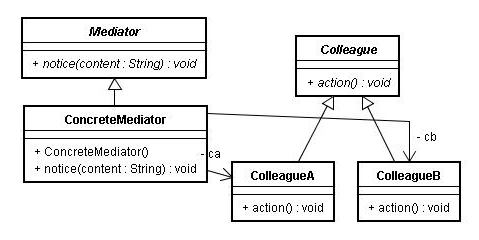1 概述
Iterator属于行为型模式中的一种,给定一个语言,定义它的文法的一种表示,并定义一个解释器,这个解释器使用该表示来解释语言中的句子。
2 适用性
- 访问一个聚合对象的内容而无需暴露它的内部表示。
- 支持对聚合对象的多种遍历。
- 为遍历不同的聚合结构提供一个统一的接口(即,支持多态迭代)。
3 参与者
- Iterator:迭代器定义访问和遍历元素的接口。
- ConcreteIterator:具体迭代器实现迭代器接口。对该聚合遍历时跟踪当前位置。
- Aggregate:聚合定义创建相应迭代器对象的接口。
- ConcreteAggregate:具体聚合实现创建相应迭代器的接口,该操作返回ConcreteIterator的一个适当的实例。
4 类图

5 代码实现
import Cocoa
/// 聚合定义创建相应迭代器对象的协议
private protocol ListProtocol {
func iterator() -> IteratorProtocol
func get(index:Int) -> AnyObject
func getSize() -> Int
func add(obj:AnyObject)
}
/// 具体聚合实现创建相应迭代器的协议,该操作返回ConcreteIterator的一个适当的实例.
private class List: ListProtocol {
/// 数组
private var list:[AnyObject] = []
/// 位置
private var index:Int = 0
/// 长度
private var size:Int = 0
func iterator() -> IteratorProtocol {
return Iterator(list: self)
}
func get(index:Int) ->AnyObject {
return list[index]
}
func getSize() ->Int {
return size
}
func add(obj:AnyObject) {
list.append(obj)
index += 1
size += 1
}
}
// MARK: -
/// 迭代器定义访问和遍历元素的协议
private protocol IteratorProtocol {
func next() ->AnyObject
func hasNext() ->Bool
}
/// 具体迭代器实现迭代器协议,对该聚合遍历时跟踪当前位置
private class Iterator: IteratorProtocol {
/// 数组
private var list:List
/// 位置
private var index:Int
init(list:List) {
self.index = 0
self.list = list
}
func next() -> AnyObject {
let obj:AnyObject = self.list.get(index)
self.index += 1
return obj
}
func hasNext() -> Bool {
return self.index < self.list.getSize()
}
}
// MARK: -
/// 迭代器
class YJIterator: YJTestProtocol {
func test() {
let list = List()
list.add("a")
list.add("b")
list.add("c")
//第一种迭代方式
let it = list.iterator();
while (it.hasNext()) {
print(it.next())
}
print("===========")
//第二种迭代方式
for (var i = 0; i < list.getSize(); i++) {
print(list.get(i));
}
}
}测试
let list = List()
list.add("a" as AnyObject)
list.add("b" as AnyObject)
list.add("c" as AnyObject)
//第一种迭代方式
let it = list.iterator();
while (it.hasNext()) {
print(it.next())
}
print("===========")
//第二种迭代方式
for i in 0 ..< list.getSize() {
print(list.get(i));
}
其他
源代码
文档修改记录
| 时间 | 描述 |
|---|---|
| 2015-11-27 | 博文完成 |






















 137
137

 被折叠的 条评论
为什么被折叠?
被折叠的 条评论
为什么被折叠?








